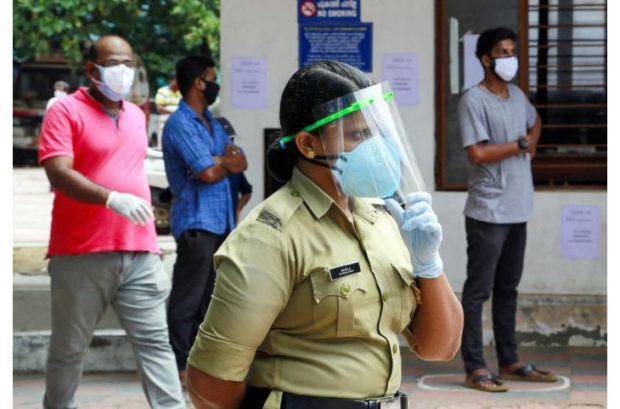
Face shields worn alone are not effective against COVID-19, says study
PTI, Dec 9, 2020, 12:51 PM IST

Image for representation
New Delhi: Face shields alone are not highly effective to prevent COVID-19 infection without masks, says a new study which assessed what happens to the airflow around these plastic screens when someone nearby sneezes.
The research, published in the journal Physics of Fluids, noted that the number of people using face shields as a substitute for face masks has been increasing in schools, universities, restaurants, and service businesses.
However, the scientists, including those from Fukuoka University in Japan, said sneezes produce a fluid phenomenon known as vortex rings that can capture microscopic particles and pass through the shield’s barrier.
”A vortex ring is a donut-shaped vortex that is generated by an instantaneous ejection of fluid from a circular orifice. his resembles bubble rings made by dolphins,” explained study co-author Fujio Akagi from Fukuoka University.
In the study, the scientists assessed what happens when a face shield wearer is exposed to a sneeze from an infected person standing one metre in front of them.
”The vortex rings generated by the sneeze capture the microscopic droplets within the sneeze and transport them to the top and bottom edges of the face shield,” Akagi said. He added that the droplets travel to the face shield wearer quickly — within 0.5 to one second after the start of the sneeze. ”If this arrival time is synchronised with inhalation, the shield wearer will inhale the droplets,” he added.
Based on the analysis, the scientists said droplets of sneezes are transported not only by the high velocity airflow caused by sneezing, but also by the vortex rings generated by sneezing. They said the microscopic droplets transported by the vortex rings can get inside the shield through its top and bottom edges.
”It was also confirmed that some particles — in this simulation, 4.4 per cent of the released droplets — entered the inside of the face shield and reached the vicinity of the nose,” the scientists wrote in the study.
The researchers believe face shields alone are not highly effective to prevent COVID-19 infection. However, by gaining a better understanding of face shield weaknesses, they hope to enhance protection by reducing the flow getting inside the shield.
”We are currently developing and demonstrating several improved shields,” Akagi said. ”We want to contribute to keeping people safe from infection, and believe that one day in the near future, medical workers will be able to prevent infection using only a face shield and a regular mask or, ideally, with only a face shield,” he added.
Udayavani is now on Telegram. Click here to join our channel and stay updated with the latest news.
Top News

Related Articles More

Anti-obesity class of drugs related with fewer post-surgery complications: Study

1.48 lakh new TB cases identified in first 30 days of 100-day intensified campaign: Nadda

HMPV: Centre asks states to increase surveillance for respiratory diseases

No need for panic, HMPV not as transmissible as Covid: Karnataka govt

HMPV cases: Karnataka Health Minister says no reason to panic
MUST WATCH
Latest Additions

Development works at MLA constituencies, caste census may be discussed at CLP meet: Minister

‘Emergency’ needs to be told to one and all, says Shreyas Talpade

South India’s first infectious disease research, diagnostic lab to come up in Bengaluru: Minister

Senior citizen fills potholes on NH-66 to prevent accidents in Nanthoor

Police making efforts to locate, recover weapons disposed of by Maoists: Karnataka Home Minister
Thanks for visiting Udayavani
You seem to have an Ad Blocker on.
To continue reading, please turn it off or whitelist Udayavani.




















